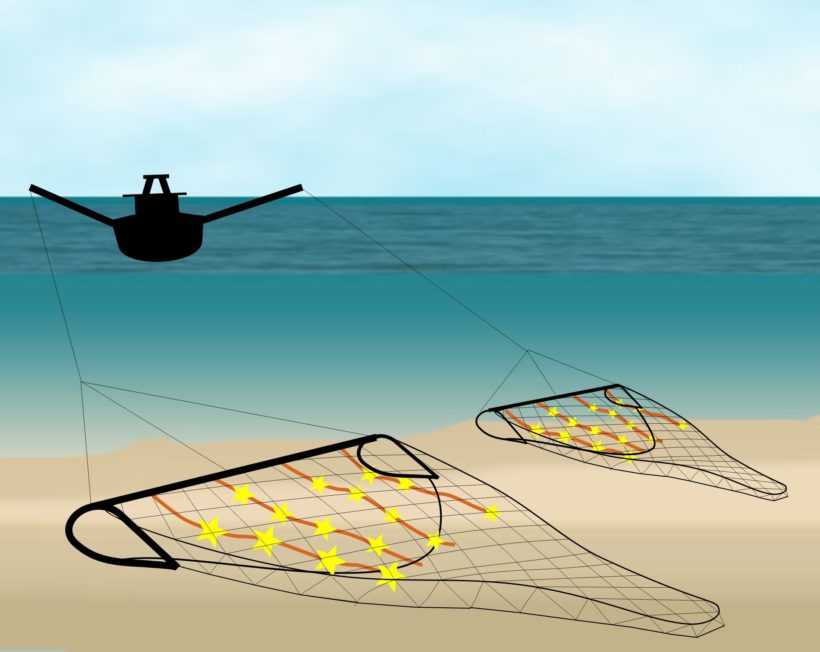
By MIRIAM ACZEL
Founded in 2005 by environmental activist Claire Nouvian, BLOOM is a French non-profit organization “that works to preserve the marine environment and species from unnecessary destruction and to increase social benefits in the fishing sector.” They have set as one of their current missions the education about and campaigning for a ban on electric pulse fishing.
According to BLOOM, electric pulse fishing is a response to the fact that fish stock levels in European waters have declined to the point where “going to sea to fish them has become economically unviable.” Rather than reducing fish captures to allow regeneration of stocks, Europe is poised to use technology in the form of electric pulses increase captures. Europe has banned the method since 1998 but allows for 5% of each country’s fleet to “study” the method. Currently, only the Dutch employ electric pulse fishing.
What is electric pulse fishing?
In electric pulse fishing, electric shocks are sent through ocean floor sediment to stun the flatfish living there that can then be scooped up in nets. Electric pulse fishing is an ‘evolution’ of ‘beam’ trawls, where ‘tickler chains’—which have a disastrous impact on marine habitats when dragged across the seabed—have been replaced by electrodes. ‘Energy efficiency’ is the main rationale used by electric pulse fishing proponents. In fact, fuel expenditures are half that of conventional beam trawls. Because the gear is lighter, it also has ‘lower impact’ on the habitat, but studies point to disastrous impacts on marine ecosystems.
According to BLOOM, the key issue is that electric currents “have no mercy on marine life” as the entire marine ecosystem is electrocuted by the pulses. Moreover, there is a lack of data on the impacts of electric pulse fishing on marine life, and particularly data on sensitive species such as sharks and rays, as well as young fish, eggs, plankton, fishes’ physiology, water chemistry, and other impacts. A study by the Dutch Institute for Marine Resources & Ecosystem Studies (IMARES) showed that 50 to 70% of large cods caught by pulse trawls had their spines broken after an electric shock.
One of the main arguments in favor of electric pulse fishing is the fuel-efficiency of the technique—but fuel efficiency is not enough to consider the technique sustainable, due to the widespread destruction of the delicate marine ecosystem.
So what is the evidence against electric pulse fishing?
Countless fishers strongly oppose electric pulse fishing due to the significant and irreversible effects on marine resources. Currently, several countries have a ban against the technology, including the United States and France. In France the coalition against the practice has brought together associations of ‘artisan fishermen,’ fishmongers, and chefs and environmental organizations. The LIFE platform (Low Impact Fishers of Europe) has published in September 2017 a collection of evidence and testimonies on the environmental and social damages of electric pulse fishing.
Behind the Recent Ban
The European Parliament and EU member states clinched an agreement on 13 February 2019 over new technical conservation measures for fishing, which include an EU-wide ban on the controversial pulse trawling starting from mid-2021. The new framework law will simplify the current set of 31 regulations on fishing gear and methods allowed within the European Union’s waters, including regulations on the minimum size of fish to be caught, as well as on restrictions on fishing activities in certain areas or during certain periods. The negotiations started in May last year, and spanned three rotating EU presidencies: Bulgarian, Austrian and now Romanian.
The debate was tough because of the disputed use of electric currents in water, which held up the entire legislation for months as the Parliament and Council could not find a common position on the subject.
Parliament took a firm stance against the activity when adopting its negotiation mandate on 16 January 2018, voting an amendment filed by the leftist GUE/NGL (United Left European/United Left Nordic) group that prohibits the use of electric fishing. In accordance with their position, MEPs also rejected in June a delegated act that would have allowed electric pulse activities on some areas off the Belgian coast.
According to Claire Nouvian, the founder of BLOOM, “it’s been a long winding road to get here. We have managed to completely turn the political ecosystem in our favor.”
Mathieu Colléter, who is in charge of BLOOM’s institutional relations, says “it took us over two years of campaigning, two formal complaints to the European Commission, a request to open a European investigation for fraud, a referral to the European Ombudsman, hundreds of meetings with Member States representatives and Parliamentarians in Brussels to obtain this full ban on electric fishing..
Nouvian recalled further that “when we started our campaign against electric fishing, the whole political ecosystem was against us…We embarked on this new, oversized fight for the small BLOOM team, because it seemed morally unacceptable to allow the electrocution of marine life. But our researchers Laetitia Bisiaux and Frédéric Le Manach have unveiled facts of unsuspected severity: a series of deeply corrupt public decisions in favor of Dutch industrial lobbies. Our campaign took an unexpected turn to fight systemic fraud, financial and legal abuse and a disturbing dysfunction of EU institutions. Today, we celebrate not only a victory for the marine environment and artisanal fishermen, but also a victory for citizens. This result is a reminder that with perseverance and rigor, a small group of motivated people, supported by the public opinion, can win against a radically hostile political and industrial system.”
More about BLOOM:
BLOOM wages awareness and advocacy campaigns in order to accelerate the adoption of concrete solutions for the ocean, humans and the climate. BLOOM carries out scientific research projects, independent studies and evaluations that highlight crucial and unaddressed issues such as the financing mechanisms of the fishing sector. BLOOM’s actions are meant for the general public as well as policy-makers and economic stakeholders.
Miriam Aczel is a President’s Scholar PhD Candidate at Imperial College London’s Centre for Environmental Policy. Her research focus is on international energy science and policy, with a focus on mitigation of environmental and health impacts of shale gas. She is also co-founder and co-director of the Amir D. Aczel Foundation for Research and Education in Science and Mathematics, a nonprofit based in Cambodia.
Miriam is Director of Communications and blog editor for Leaders in Energy.



Leave a Reply